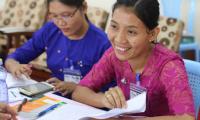The Denmark-Myanmar Programme on Rule of Law and Human Rights

The Denmark-Myanmar Programme on Rule of Law and Human Rights supported the Union Attorney General’s Office, the Office of the Supreme Court of the Union, lawyers, civil society organisations as well as the law departments of Universities of Dagon, East Yangon and Mandalay in Myanmar.
The programme focused on strengthening capacities on core aspects of rule of law and human rights and supporting reform in relevant justice areas. The programme running from 1 February 2017 – 31 January 2021, had a total grant of DKK 70 million (approximately USD 10 million).The programme was funded by the Embassy of Denmark in Myanmar and was jointly implemented by the Danish Institute for Human Rights (DIHR) and the International Commission of Jurists (ICJ).
Purpose
The strengthening of capacity of state actors, academic institutions and civil society to work towards promoting, protecting and respecting human rights is pivotal for the society.
During the military rule the universities and especially the legal education was isolated and consequently drastically deteriorated. Further, human rights education and teaching human rights law was not permitted within the law curriculum at the time. This presents a serious challenge for the achievement of human rights and a justice system founded on rule of law and human rights principles. The work of the Denmark-Myanmar Programme in supporting universities in establishing human rights education is a first step towards promoting actual change on the ground and enhancing the legal education
The difference we made
The Danish Institute for Human Rights' worked closely in support of the three partner universities’ in their establishment and integration of human rights education within the law curriculum. The interventions are designed and founded in human rights-based approach to development principles and was guided by the programme development outcome. Each year, the Institute consulted and engaged the head of the law departments and professors on strategic priorities which helped ensure and reinforce ownership.
Snapshot of the human rights education component:
· Human rights education – focusing on enhancing knowledge of human rights and human rights education teaching methodologies capacity focusing on values, skills and attitudes;
· Joint research initiatives that seeked to expand and deepen knowledge of human rights as well as cultivate a vibrant research environment;
· Enhancing access to human rights knowledge through the establishment of Human Rights Resource Centers;
· Enhanced access to justice through establishment of university Legal Information Centers (LIC).
Starts: 2016
Ends: January 2021
